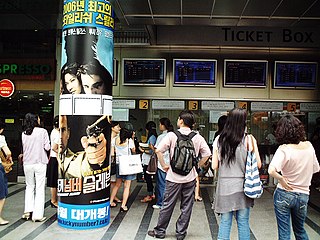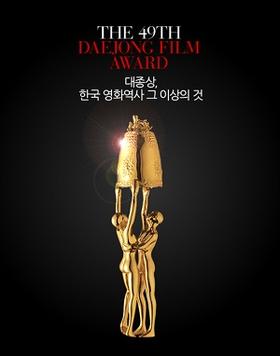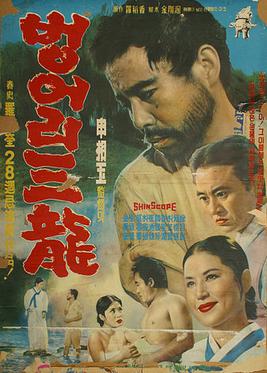| Lists of South Korean films by year |
|---|
 |
| Korean Animation |
A list of films produced in South Korea in 1988:
| Lists of South Korean films by year |
|---|
 |
| Korean Animation |
A list of films produced in South Korea in 1988:

South Korea, officially the Republic of Korea (ROK), is a country in East Asia. It constitutes the southern part of the Korean Peninsula and borders North Korea along the Korean Demilitarized Zone. The country's western border is formed by the Yellow Sea, while its eastern border is defined by the Sea of Japan. South Korea claims to be the sole legitimate government of the entire peninsula and adjacent islands. It has a population of 51.96 million, of which roughly half live in the Seoul Capital Area, the fourth most populous metropolitan area in the world. Other major cities include Incheon, Busan, and Daegu.
Blind may refer to:

The 1988 Summer Olympics, officially known as the Games of the XXIV Olympiad and commonly known as Seoul 1988, was an international multi-sport event held from 17 September to 2 October 1988 in Seoul, South Korea. 159 nations were represented at the games by a total of 8,391 athletes. 237 events were held and 27,221 volunteers helped to prepare the Olympics.
The following is an overview of events in 1988 in film, including the highest-grossing films, award ceremonies and festivals, a list of films released and notable deaths.

The term "Cinema of Korea" encompasses the motion picture industries of North and South Korea. As with all aspects of Korean life during the past century, the film industry has often been at the mercy of political events, from the late Joseon dynasty to the Korean War to domestic governmental interference. While both countries have relatively robust film industries today, only South Korean films have achieved wide international acclaim. North Korean films tend to portray their communist or revolutionary themes.

The Korean Wave or Hallyu is a cultural phenomenon in which the global popularity of South Korean popular culture has dramatically risen since the 1990s. Worldwide interest in Korean culture has been led primarily by the spread of K-pop and K-dramas, with keystone successes including BTS and Psy's "Gangnam Style", as well as Jewel in the Palace, Winter Sonata, and Squid Game. The Korean Wave has been recognized as a form of soft power and as an important economic asset for South Korea, generating revenue through both exports and tourism.

Bong Joon-ho is a South Korean film director, producer and screenwriter. The recipient of three Academy Awards, his filmography is characterised by emphasis on social and class themes, genre-mixing, black humor, and sudden tone shifts.

The cinema of North Korea began with the division of Korea and has been sustained since then by the ruling Kim dynasty. Kim Il-sung and his successor Kim Jong-il were both cinephiles and sought to produce propaganda films based on the Juche ideology.

South Korean films have been heavily influenced by such events and forces as the Korea under Japanese rule, the Korean War, government censorship, the business sector, globalization, and the democratization of South Korea.

The Grand Bell Awards, also known as the Daejong Film Awards, is an awards ceremony presented annually by The Motion Pictures Association of Korea for excellence in film in South Korea.

Jung is a Latin alphabet rendition of the Korean family name "정", also often spelled Jeong, Chung, Joung or Jong. As of the South Korean census of 2015, there were 2,407,601 people by this name in South Korea or 4.84% of the population. The Korean family name "정" is mainly derived from three homophonous hanja. 鄭 (2,151,879), 丁 (243,803) and 程 (11,683). The rest of the homophonous hanjas include: 政 (139), 桯 (41), 定 (29), 正 (22) and 情 (5).
This is a list of films by year produced in the country of South Korea which came into existence officially in September 1948. The lists of Korean films are divided by period for political reasons. For earlier films of united Korea see List of Korean films of 1919–1948. For the films of North Korea see List of North Korean films. For an A-Z list of films see Category:Korean films.
The Baeksang Arts Awards, also known as the Paeksang Arts Awards, are awards for excellence in film, television and theatre in South Korea. The awards were introduced in 1965 by Chang Key-young, the founder of the newspaper Hankook Ilbo, whose pen name was "Baeksang". It was established for the development of Korean popular culture and art and for enhancing the morale of artists. They are regarded as one of the most prestigious entertainment awards in South Korea.

Deaf Sam-yong is a 1964 South Korean drama film directed, produced by Shin Sang-ok, based on the 1925 short story of the same title by Na Do-hyang. It was chosen as Best Film at the Grand Bell Awards. The film was also selected as the South Korean entry for the Best Foreign Language Film at the 37th Academy Awards, but was not accepted as a nominee.

Park Joong-hoon is a South Korean actor.
South Korea has one time zone, Korea Standard Time (GMT+9), which is abbreviated KST. South Korea currently does not observe daylight saving time.
Lee Hye-young is a South Korean actress. She is the daughter of celebrated film director Lee Man-hee, who died in 1975 when she was in middle school. Lee began her acting career in 1981 at the age of 18 through a local musical theatre production of The Sound of Music. Since then she has performed in theater, feature and short films, and television. She was one of the most prominent South Korean actresses in the 1980s, starring in films such as The Blazing Sun (1985), Winter Wanderer (1986), Ticket (1986), The Age of Success (1988), North Korean Partisan in South Korea (1990), Fly High Run Far (1991), Passage to Buddha (1993), and No Blood No Tears (2002). Lee also played supporting roles in the Korean dramas I'm Sorry, I Love You (2004), Fashion 70's (2005) and Boys Over Flowers (2009).

Ryu Jun-yeol is a South Korean actor, activist, and photographer. Ryu began his acting career in independent films, and then rose to prominence through his breakthrough role in the critically acclaimed television series Reply 1988 (2015–2016), the highest-rated drama in Korean cable television history at the time, which also led to him winning various Best New Actor Awards in South Korea. Known as a prolific Chungmu-ro actor, since then he has starred in the box-office hit films The King (2017), A Taxi Driver (2017), Little Forest (2018), Believer (2018), Money (2019), The Battle: Roar to Victory (2019), and The Night Owl (2022).
Freezing Point is the debut novel of Japanese novelist Ayako Miura, first serialized on Asahi Shimbun between 1964 and 1965. The novel won Asahi Shimbun's Ten Million Yen Award.